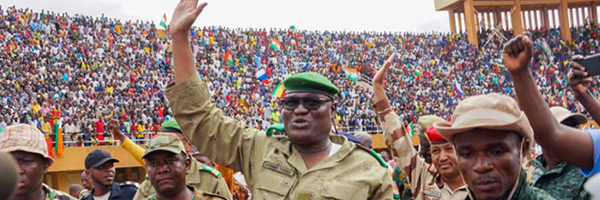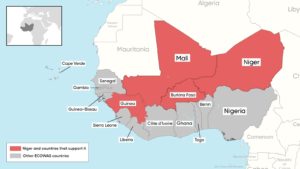African Union Will Not Back ECOWAS Intervention in Niger
 Pavan Kulkarni, Orinoco Tribune, Aug 22, 2023 —
Pavan Kulkarni, Orinoco Tribune, Aug 22, 2023 —
Niger’s popular military government has been consolidating domestic and regional support. Meanwhile, ECOWAS is beset by disunity and domestic opposition after threatening military intervention to restore the ousted Mohamed Bazoum with the backing of France and US
The African Union (AU) said on Wednesday, August 16, that it will not support the military intervention that the Economic Community of West African States (ECOWAS) is planning, with the backing of France and the US, to restore ousted Mohamed Bazoum to Niger’s presidency. Bazoum was deposed in a popularly-welcomed coup on July 26.
10 days after the expiry of the deadline given by ECOWAS to Niger’s military government to restore Bazoum, the sub-regional bloc is beset by internal disagreements and domestic opposition in its member states.
After the ECOWAS heads of states ordered on August 10 “the deployment of the ECOWAS Standby Force” and directed “the Chiefs of Defense Staffs to immediately activate” it, the chiefs were scheduled to meet on August 12 to set the wheels in motion.
However, due to “technical reasons,” the meeting was postponed, initially for an indefinite period. In the meantime, ECOWAS member Cabo Verde refused to support the military intervention, which its president Jose Maria Neves told AFP will only “make the situation worse, turning the region into an explosive zone.”
ECOWAS announced later on Tuesday that its member states’ chiefs of staffs will meet in Ghana’s capital Accra on Thursday and Friday to work out further details of the troop deployment.
Ghanaian MPs oppose deployment of its troops
Ahead of this meeting, an anti-war rally was reported on Monday, August 14, in Ghana’s city of Takoradi. Warning Ghana’s president, Nana Akufo-Addo, against dragging the county into a “proxy geopolitical confrontation,” opposition MPs objected to the deployment of Ghanaian troops as a part of the ECOWAS effort.
“Military deployment will be the straw that breaks the back of the camel of “stability” in many West African countries. It could provoke mutinies, and accelerate, rather than halt, the wave of coups d’etat the region is experiencing,” the Socialist Movement of Ghana (SMG) had earlier warned.
Should Akufo-Addo go on to send Ghanaian troops, the Ghana Union Movement (GUM), the country’s third largest party, will “back a very serious demonstration in the country,” its founder Christian Kwabena Andrews warned on Tuesday.
Samuel Okudzeto Ablakwa, MP from the largest opposition party National Democratic Congress (NDC) and a Ranking Member of Parliament’s Foreign Affairs Committee deemed “Akufo-Addo’s refusal to submit his Niger Policy to Parliament” as “most undemocratic.” His statement added, “West African leaders who purport to be lecturing Niger on democracy must be seen leading by example at home.”
With the NDC having the same number of seats in the parliament as the ruling New Patriotic Party (NPP), Akufo-Addo may struggle to secure parliamentary approval to deploy Ghanaian troops.
ECOWAS chairperson unable to gain support of his own country’s senate
Nigeria’s senate earlier this month refused to support President Bola Tinubu’s plan to deploy troops. Nigeria is Africa’s most populous country and its largest economy, amounting to about 67% of ECOWAS’ GDP. It also has the largest military in the bloc.
The killing of 23 army personnel on August 14 in an ambush by terrorists in Nigeria’s Niger state is another reminder of the pertinence of the senators’ warning that Nigeria’s military “is highly ill-equipped and not prepared to fight any war.”
Under the circumstances, they had argued, “the Federal Government should focus on solving the Boko Haram, banditry, and ESN/IPOB menaces… instead of contemplating going to war in a foreign country.”
Nevertheless, ECOWAS has persisted in threatening military intervention in Niger, even though Tinubu, who is its current chair, is unable to secure the support of his own senate for such an intervention.
Waving flags of Nigeria and Niger together, anti-war protesters, who took to the streets on Saturday in Nigeria’s Kano State on the border with Niger, sloganeered: “Nigeriens are our brothers; Nigeriens are also our family.” They denounced the plans for aggression against their northern neighbor as “a plot by Western forces.”

Senegal and Benin have committed an unspecified number of troops for the ECOWAS invasion. Joining the fray is also Sierra Leone, whose president Julius Bio is facing a crisis of domestic legitimacy after retaining power in June this year in a violent election, the credibility of whose results is widely challenged by domestic observers, the US, UK, France and the EU.
Ivory Coast has committed 850 to 1,100 troops. “This coup d’etat is not acceptable,” maintains its president Alassane Ouattara, who came to power in 2011 with the help of a military offensive backed by US and France against the incumbent to whom Ouattara had officially lost a disputed election.
Liberia, along with Gambia — where the ECOWAS had previously intervened in 2017 — have been sitting on the fence, undecided as yet on whether or not to send troops.
ECOWAS backers, France and US, disagree
Further stultifying the bloc is the fact that strong disagreements are also surfacing between its main backers — Niger’s former colonizer France, which has up to 1,500 troops in the country, and the US, with another 1,100 troops in two bases.
Keener on military action, France is reportedly opposed to the US line of seeking further negotiations, and is unwilling to accept anything less than the reinstatement of its close ally Bazoum.
Jean-Luc Mélenchon, a former member of France’s National Assembly and leader of France Unbowed, termed the French backing of ECOWAS’ military action as “irresponsible amateurism.” He insisted that “France must not engage in a military expedition against” the AU’s decision opposing it.
While this fractured coalition against Niger has been wavering after ordering the “deployment of the ECOWAS Standby Force,” Niger has received firm support from Mali, Burkina Faso, and Guinea. All three were suspended and sanctioned by ECOWAS after similar popularly-supported coups, backed by anti-French mass movements.
Mali and Burkina Faso, whose popular military governments have successfully ordered the French troops out, have declared that their military forces will come to the defense of Niger, treating any attack on it as an attack also on them.
Niger’s military government consolidates domestic support
In the meantime, Niger’s military government, the National Council for the Safeguard of the Homeland (CNSP), which ordered the French troops out soon after the coup against Bazoum, has been consolidating support domestically.
While France has refused to withdraw from Niger, arguing that it only recognizes the authority of Bazoum, thousands of Nigeriens protested outside its military base in capital Niamey last week.
On Monday, CNSP announced that Bazoum would be tried for “High Treason” for inviting foreign powers to invade Niger. The following day, Abdoulaye Seydou, leader of the M62 Movement which had been leading the protests demanding the removal of French and other foreign troops from the country, was released from prison.
Bazoum’s regime, which was cracking down on the anti-French movement, had arrested Seydou in January in what Frontline Defenders deemed to be an “arbitrary detention… directly linked to his peaceful and legitimate work in defense of human rights.”
Since the coup against Bazoum, tens of thousands have been taking part in demonstrations and rallies backing the CNSP against France and Bazoum, whom they perceive as the former colonizer’s puppet.
The statement released by the International Peoples’ Assembly (IPA) calling for the “immediate removal of foreign military bases from Niger and other African countries” was signed by organizations across the region such as Parti Comuniste de Benin, Nigerian Union of Allied Health Professionals, Socialist Movement of Ghana, Parti Communiste Révolutionaire de Côte d’Ivoire, Partido Africano para Independência de Guinee e Cabo Verde, Conféderation Libre des Travailleurs de la Mauritanie, Workers Democratic Way, The Collective of Saharawi Human Rights Defenders in Western Sahara, Communist Party of Jordan, Union of Iraqi Trade Unions, Party of Popular Socialist Coalition, Federation of Workers Councils and Unions, Tunisian Workers Party, Palestinian People Party, and the We Can Movement (Mauritania).
